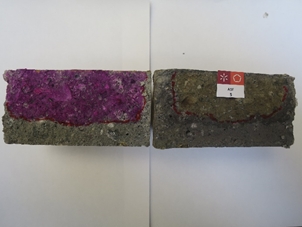Effect of coupled deterioration by chloride and carbonation on chloride ions transport in concrete
DOI:
https://doi.org/10.21809/rilemtechlett.2020.126Keywords:
Chloride transport; Carbonation; Coupled deterioration; Accelerated testAbstract
Carbonation is one of the factors that can influence the chlorides transport. Despite the combined action of chlorides and carbonation being a reality, there is no consensus on the effect of this coupled deterioration on chloride transport. Accelerated tests were used to simulate this environment. Concrete specimens were cast using 0.60 water/cement ratio and CEM I 42.5R. After curing, half of specimens was submitted to accelerated carbonation test (20ºC, 55% RH and 4% CO2) during 1 and 7 months. The other half was protected with plastic film during the same period. Then, the specimens were submitted to the accelerated chlorides attack using: migration test and immersion test. Finished the immersion test, powder samples were extracted from surface to bulk and analysed to obtain free and total chloride profiles and pH profile. According to migration test results, the carbonation increases chloride transport regardless the test period. According to the immersion test results, there is a decrease in chloride ions transport when the specimens are carbonated for 1 month and a noticeable increase when carbonation period increases to 7 months. The redistribution of pores in carbonated concrete and the difficulty of chlorides binding in carbonated concrete are related to these results.

Downloads
Published
How to Cite
Issue
Section
License
Authors retain copyright of the articles published in RILEM Technical Letters and grant the journal the right of first publication with open access. The work is simultaneously licensed under Creative Commons Attribution 4.0 International License (CC BY 4.0) that allows others to share and adapt the work under the following terms: 1) a proper attribution is given in a form of bibliographic record with the DOI link directing to RILEM Technical Letters; 2) a link to the license is provided; 3) the changes (if any) are indicated.









